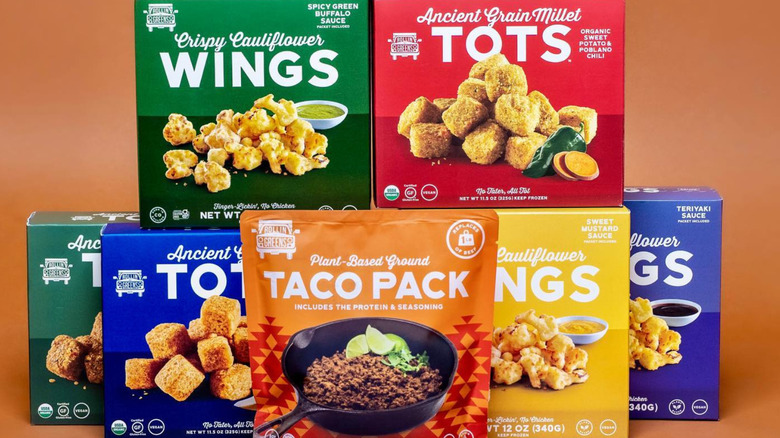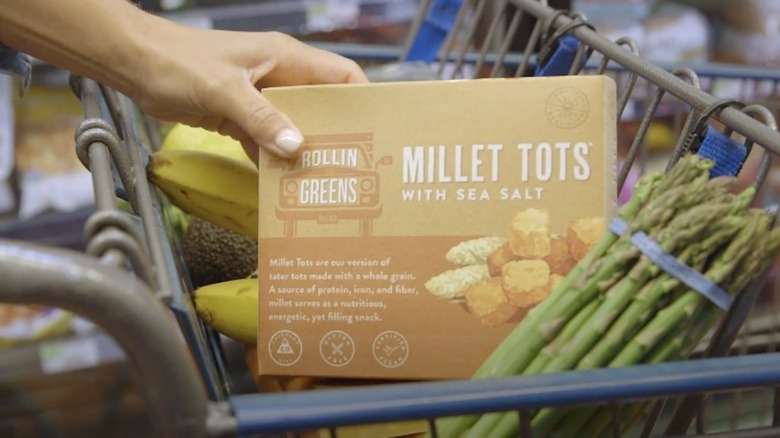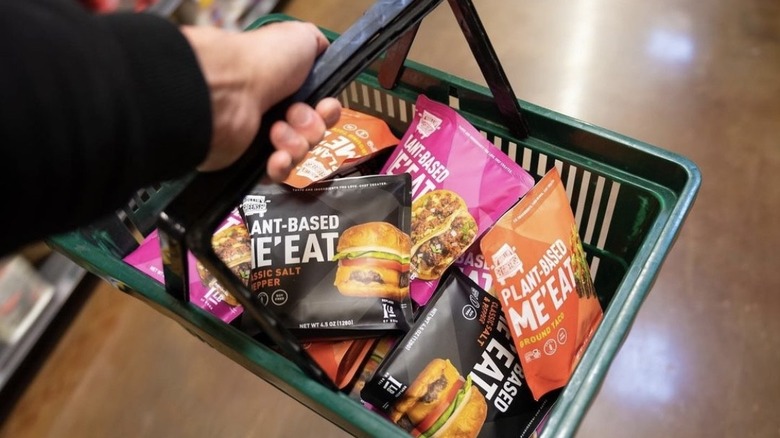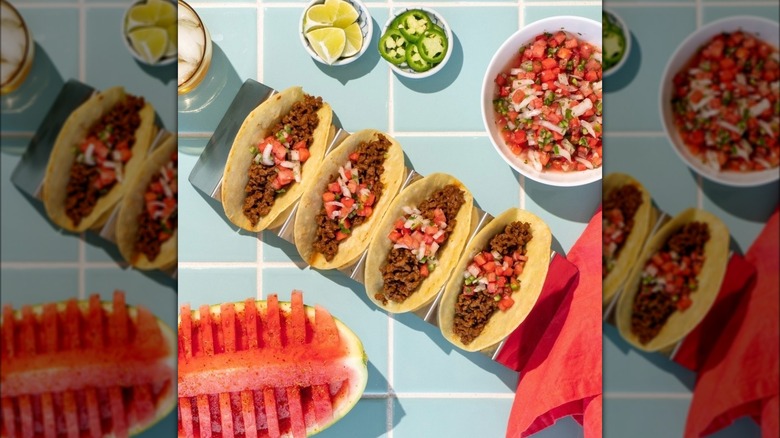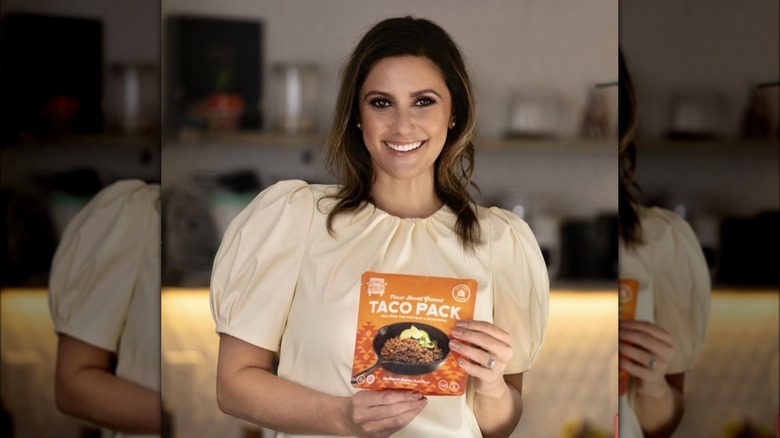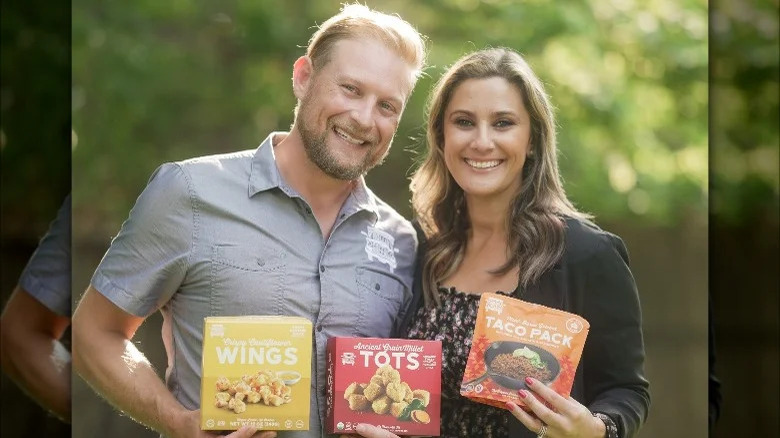RollinGreens After Shark Tank: We Caught Up With One Of The Founders
If you take a trip down the meatless section of your grocery store's frozen aisle, you're likely to find a ton of plant-based foods, including mock pork, beef, and chicken. In a short time, the market has grown very receptive to vegan and vegetarian meal products — which is good news for plant-based eaters and businesses alike. One of the companies making a splash in the world of plant-based meal alternatives is RollinGreens.
Before appearing on Season 11 of "Shark Tank," the company, comprised of husband-and-wife team Ryan "chef Ko" and Lindsey Cunningham. RollinGreens stuck to selling ancient grain millet tots and cauliflower wings before eventually evolving into plant-based "ME'EAT" replacements. The ingenuity of these products, as well as their market potential, attracted investors to RollinGreens' product line and helped expand offerings to stores and include more plant-based meal replacements for hungry customers. We checked in with Lindsey Cunningham to see what RollinGreens is up to after its appearance on "Shark Tank." She told us what the next chapter for the company looks like.
RollinGreens on Shark Tank
The RollingGreens co-founders appeared on "Shark Tank" stating that the business brought in $320,000 in 2018 and sold its products to retailers like Kroger and Target. To entice the sharks, the founders cited that their products had doubled in sales between 2018 and 2019 and offered samples of their millet tots and cauliflower wings. Kevin O'Leary ("Mr. Wonderful") lauded the plant-based products on "Shark Tank," saying, "This stuff is spectacular; it's delicious." Although the Sharks loved the product and its premise, they expressed concern over the business aspects of RollinGreens. Many of the Sharks noted that the company's margins were thin, with guest Shark Daniel Lubetzky and Lori Greiner backing out quickly.
Not all hope was lost for RollinGreens, though. The Cunninghams initially asked for a $500,000 investment at 10% equity and walked away with a deal with Robert Herjavec for 20%. However, the deal ended up not being completed. Despite this, the air-time and public interest in the company resulting from "Shark Tank" has increased, leading to market success for chef Ko and Cunningham.
RollinGreens after Shark Tank
RollinGreens saw immediate success following their appearance on "Shark Tank." Cunningham notes that close to half of the revenue from 2020 came as a direct result of appearing on the show via online sales.
Although their cauliflower wings and millet tots saw immediate growth after the show, the company wanted to expand more into the shelf-stable plant-based foods market and offer even more meatless alternatives for their customers. They eventually discontinued their plant-based frozen tots and wings and transitioned entirely to their ME'EAT product line. Cunningham told us that this decision was in alignment with the company's mission to offer more sustainable, plant-based, and convenient options for their following.
The Cunningham's efforts did not go unnoticed. Shopping channel QVC crowned RollinGreens the "best plant-based food" of 2021. The company has since expanded to nearly 4,500 stores across the country, including Big Y, Wegman's, and Walmart, and brought in around $4 million in 2022, according to the Gazette Review.
Shifting products and business
Since appearing on "Shark Tank," RollinGreens has expanded its product line to include gluten-free and soy-free ME'EAT in taco, salt and pepper, and chorizo varieties, as well as plant-based chopped CHIC'KEN strips for fajitas. Unlike many other products on the market, these products can be ready-made in under 10 minutes and do not require any refrigeration, which Cunningham believes is a quality that sets her company's products apart from the others.
Despite a pivot away from frozen plant-based foods and into shelf-stable foods, the company has seen great success and "healthy margins," Cunningham tells us. The largest pillar of the company remains in brick-and-mortar stores and major retailers like Whole Foods, Meijer, Albertsons, and Kroger, but the company has also seen substantial growth from its B2B sales and food service.
Cunningham says that the emphasis on brick-and-mortar sales, especially during the COVID-19 pandemic, was key to the company gaining footholds with so many retailers. This wouldn't have been possible without the boom of online sales bringing in more revenue. "We knew brick-and-mortar was staying here, regardless," she shares. "And we really just focused on our core consumer and taste, clean ingredients, the versatility of our products of value as well."
Empowering current and potential plant-based eaters
Chef Ko and Cunningham both identify as "flexitarians," meaning that they eat a mixture of plant-based and occasional vegetarian or meat-based meals. As a brand, they're hoping that their products don't just target plant-based eaters but those who are in flux and transitioning to a plant-based diet, too. "I truly believe that even small changes, like incorporating one plant-based meal per week into your diet, right like that can ladder up to big things, both for your health and the planet," Cunningham explains.
One of the strengths of the new ME'EAT product, for Cunningham, is that it is shelf-stable and allows customers to focus on other components of the meal rather than the protein. She also shares that customers won't have to worry about their ground beef expiring in their fridge, which is especially valuable for consumers looking to build a long-lasting pantry. "To have this incredible food in your pantry is a game-changer," Cunningham shares.
During the pandemic, RollinGreens made products more accessible to its consumer base by not raising prices. Cunningham reported that the brand has not seen inflation in its product, which increases its affordability. Plus, unlike beef, the ME'EAT cooks down pound-for-pound and doesn't have significant moisture or fat loss.
The next chapter for RollinGreens
RollinGreens has found success since its appearance on national television, but Cunningham is grateful for the brand's humble roots in Boulder, Colorado. She explains that the company's journey and chef Ko's long history with the RollinGreens empire has been "serendipitous." "We consider ourselves experts in retail, but we're constantly evolving and growing," she shares.
Cunningham couldn't share much about the company's next product reveal, but she suggested the company would expand into "new products" and "new categories" within the coming years. One of the spaces where she sees the most potential is in healthy, ready-to-go meal options. However, she notes that the company still plans to stay strong with shelf-stable products on shelves in grocery stores and expand its reach in major retailers — and reach upwards of 5,000 stores by the end of 2023. The most rewarding part of the business was sharing plant-based "tasty, healthy, and affordable" food — and the next chapter for RollinGreens is bound to be full of it.
Lessons learned from Shark Tank
Cunningham admits she wouldn't want to do anything differently if she were to go on the show again. "I think it was a phenomenal experience." She said. "I think we went in there really wanting to make a deal, and the PR benefit is just an added bonus."
Cunningham reflected on her time on the show and how she helped kickstart RollinGreens at age 22. She says that she could "never be prepared enough" for national television but let her product and RollinGreens' mission be the guiding light for her journey through entrepreneurship. She recommends other entrepreneurs do the same. "I would say just go out there and give it your best shot. But in the end, if you know your business, it will shine through," she tells us. "And you will do well, whether the Sharks see that or consumers see that. Your story and your product will shine through."
